Before we get to this month’s “Ask the Sweethearts” question, we have a few major announcements.
First, we are very sorry to say goodbye to Darcy Woods. She is the sweetest of sweethearts, but as she mentioned in last month’s column, she has made a commitment to take care of herself and cut back on her obligations this year, and sadly for us, that includes her participation here. We know you all will want to keep up with Darcy and her books, so be sure to follow her on Twitter and Instagram and Goodreads.
On a happier note, we are super excited to welcome Sweetheart Melanie Hooyenga to the site! Melanie was our first ever guest author and is author of the very fun YA contemporary romance “Rules” series.
Finally, a huge congratulations to Melanie on the March 9 release of the second book in her “Rules” series, THE TRAIL RULES, and to Sweetheart Karole Cozzo on the May 15 release of her new novel, THE GAME CAN’T LOVE YOU BACK. Both are available for pre-order, so be sure to check them out!
Now, on to our question: “When the going gets tough, what gets you going?”
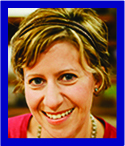 Melanie Hooyenga: I’m anxious by nature and always tend to have 15-too-many things going on at any given time, so when push comes to shove, I find making a list and prioritizing what REALLY needs to get done helps me stay focused. Being able to look at actual deadlines and know what order I need to do things makes it all a bit more manageable. But I’ve also learned to recognize when something has to give. Sometimes it’s cleaning the house, other times it’s exercising — but when the only way to get through my to-do list is to scribble a few things out, that’s what I do. Then I make sure to take a moment to celebrate before starting all over again.
Melanie Hooyenga: I’m anxious by nature and always tend to have 15-too-many things going on at any given time, so when push comes to shove, I find making a list and prioritizing what REALLY needs to get done helps me stay focused. Being able to look at actual deadlines and know what order I need to do things makes it all a bit more manageable. But I’ve also learned to recognize when something has to give. Sometimes it’s cleaning the house, other times it’s exercising — but when the only way to get through my to-do list is to scribble a few things out, that’s what I do. Then I make sure to take a moment to celebrate before starting all over again.
 Robin Constantine: Radical self-care — and not just as a reward but as needed. I can’t take credit for that term — that’s from Anne Lamott. For me it means slowing down, getting quiet and figuring out what I need in that moment to help me get over a creative hurdle. Sometimes it’s blowing things off and going to the movies or for a walk or taking a bath or doing something I’ve always wanted to do — like baking macarons! Anything that gets me away from writing for a while. If I let my mind relax into an activity where there’s no measuring my “success,” I always come back to a project with fresh eyes.
Robin Constantine: Radical self-care — and not just as a reward but as needed. I can’t take credit for that term — that’s from Anne Lamott. For me it means slowing down, getting quiet and figuring out what I need in that moment to help me get over a creative hurdle. Sometimes it’s blowing things off and going to the movies or for a walk or taking a bath or doing something I’ve always wanted to do — like baking macarons! Anything that gets me away from writing for a while. If I let my mind relax into an activity where there’s no measuring my “success,” I always come back to a project with fresh eyes.
 Stephanie Scott: There are a few kinds of tough in my eyes: the real-life-is-invading-all-of-my-creative-spaces and then zero artistic motivation. I’m currently battling both! When it’s a life issue getting in the way of my writing, I go back to my planner and get organized. What can I schedule, what can I set aside, what is easy that can be checked off today? When I lack motivation, that to me is trickier than just being busy. I tend to go back to what I wish I had time for when I’m too busy: cooking, art projects, or exploring my neighborhood. I like to play video games, and often don’t because it’s such a time suck. Sometimes that break can be really refreshing. Usually what gets me going again after a creative break is to read a really good book — not just a good book, but the kind of book that reminds me why I love stories in general.
Stephanie Scott: There are a few kinds of tough in my eyes: the real-life-is-invading-all-of-my-creative-spaces and then zero artistic motivation. I’m currently battling both! When it’s a life issue getting in the way of my writing, I go back to my planner and get organized. What can I schedule, what can I set aside, what is easy that can be checked off today? When I lack motivation, that to me is trickier than just being busy. I tend to go back to what I wish I had time for when I’m too busy: cooking, art projects, or exploring my neighborhood. I like to play video games, and often don’t because it’s such a time suck. Sometimes that break can be really refreshing. Usually what gets me going again after a creative break is to read a really good book — not just a good book, but the kind of book that reminds me why I love stories in general.
 Erin Fletcher: When the going gets tough, there are many things that get me going (including escaping between the pages of a good book in a bubble bath with a glass of wine). But the one that works best is to do something for someone else. Sometimes I bake cookies for a friend or volunteer at my church. Other times I send a hand-written “just because” card to a family member. Or go shopping for groceries to donate to a food pantry. Or find a Donors Choose project to support. Or offer to babysit for an overwhelmed single mom. The possibilities are endless, but one thing is for sure: When I focus on meeting the needs of someone else, my tough going goes right away!
Erin Fletcher: When the going gets tough, there are many things that get me going (including escaping between the pages of a good book in a bubble bath with a glass of wine). But the one that works best is to do something for someone else. Sometimes I bake cookies for a friend or volunteer at my church. Other times I send a hand-written “just because” card to a family member. Or go shopping for groceries to donate to a food pantry. Or find a Donors Choose project to support. Or offer to babysit for an overwhelmed single mom. The possibilities are endless, but one thing is for sure: When I focus on meeting the needs of someone else, my tough going goes right away!
 Karole Cozzo: Wow, I don’t know if an answer has ever announced itself so instantaneously in my head! What keeps me going … what gets me going, when I feel like I could throw in the towel is most definitely my writing pallies. I can’t imagine what the writing endeavor would feel like without the supportive, reassuring, positive, and motivating writers’ community that I’m a part of. This group of people is always willing to listen to fears, anxieties, frustrations, and disappointments. They don’t always have the answers, but they certainly can provide understanding and perspective. There’s next to nothing that an author goes through that hasn’t been experienced by another author, and sometimes you just need to hear you’re not alone and be reminded how tough this business can be. My writing friends understand this in a way that only fellow authors can. They’re my sounding board, my punching bag, my cheerleaders, my rays of sunshine.
Karole Cozzo: Wow, I don’t know if an answer has ever announced itself so instantaneously in my head! What keeps me going … what gets me going, when I feel like I could throw in the towel is most definitely my writing pallies. I can’t imagine what the writing endeavor would feel like without the supportive, reassuring, positive, and motivating writers’ community that I’m a part of. This group of people is always willing to listen to fears, anxieties, frustrations, and disappointments. They don’t always have the answers, but they certainly can provide understanding and perspective. There’s next to nothing that an author goes through that hasn’t been experienced by another author, and sometimes you just need to hear you’re not alone and be reminded how tough this business can be. My writing friends understand this in a way that only fellow authors can. They’re my sounding board, my punching bag, my cheerleaders, my rays of sunshine.
 Linda Budzinski: Usually for me, life and writing get tough when I feel overwhelmed and have too much going on. If I’m being honest, my typical reaction is denial, followed by another dose of denial, followed by a whole lot more denial. When I finally get to a breaking point, I have to step away from it all and give myself a break. This can mean binge-watching a reality show on Bravo or a trip to Burlington Coat Factory or an afternoon spent browsing through my magazine pile. Usually, that break is enough to clear my mind and make me more productive when I get back to my “to do” list. And often at that point I’ll realize there is one specific item on my list that has led to the feeling of being overwhelmed — something I’ve been avoiding. That is the one thing I need to tackle first, and then everything else falls into place.
Linda Budzinski: Usually for me, life and writing get tough when I feel overwhelmed and have too much going on. If I’m being honest, my typical reaction is denial, followed by another dose of denial, followed by a whole lot more denial. When I finally get to a breaking point, I have to step away from it all and give myself a break. This can mean binge-watching a reality show on Bravo or a trip to Burlington Coat Factory or an afternoon spent browsing through my magazine pile. Usually, that break is enough to clear my mind and make me more productive when I get back to my “to do” list. And often at that point I’ll realize there is one specific item on my list that has led to the feeling of being overwhelmed — something I’ve been avoiding. That is the one thing I need to tackle first, and then everything else falls into place.
How about you? When the going gets tough, what gets you going? Tell us in the comments!

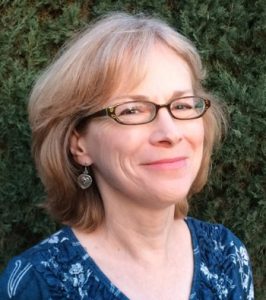 Welcome to Patricia Tighe, our first guest of 2018! Patricia is author of LIFE IN THE NO-DATING ZONE, LIFE IN THE LUCKY ZONE, AND LIFE IN THE DANGER ZONE (yes, you guessed it, that’s a series!). Her newest novel, ABOUT LAST SUMMER, is about a girl who assumes a fake identity on a dare, which is all fun and games … until she runs into the boy she dated (you guessed it again!) last summer!
Welcome to Patricia Tighe, our first guest of 2018! Patricia is author of LIFE IN THE NO-DATING ZONE, LIFE IN THE LUCKY ZONE, AND LIFE IN THE DANGER ZONE (yes, you guessed it, that’s a series!). Her newest novel, ABOUT LAST SUMMER, is about a girl who assumes a fake identity on a dare, which is all fun and games … until she runs into the boy she dated (you guessed it again!) last summer!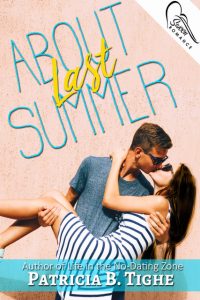 What gave you the idea to write this novel?
What gave you the idea to write this novel? Back in 2005, I completed my first manuscript. I was jazzed to learn that I could, in fact, accomplish such a thing, that I could take a story from start to finish without getting bored and starting something new or bowing out because I felt overwhelmed or lost along the way. I started Googling “how you get a book published” and quickly realized (especially back then), that querying and finding a literary agent was a necessary first step in the process, especially if an author had any hope of being considered by well-known publishing companies.
Back in 2005, I completed my first manuscript. I was jazzed to learn that I could, in fact, accomplish such a thing, that I could take a story from start to finish without getting bored and starting something new or bowing out because I felt overwhelmed or lost along the way. I started Googling “how you get a book published” and quickly realized (especially back then), that querying and finding a literary agent was a necessary first step in the process, especially if an author had any hope of being considered by well-known publishing companies.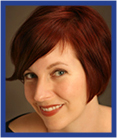 Darcy Woods: For the past few years, I’ve said YES to virtually all the invites and opportunities that have come my way. So when 2018 rolled around, I decided to declare it the Year of NO! That doesn’t mean I’ll say no to everything, or that I regret the years of yeses — not by a long shot! They’ve led to so many unforgettable experiences, expanded horizons, and lasting friendships. I’ve just come to recognize the Yes Years are not infinitely sustainable for me. (Egads, I’m human after all!) Time might be one of the most precious gifts we can give ourselves. And with 2017 being an especially tumultuous year, I intend to do just that!
Darcy Woods: For the past few years, I’ve said YES to virtually all the invites and opportunities that have come my way. So when 2018 rolled around, I decided to declare it the Year of NO! That doesn’t mean I’ll say no to everything, or that I regret the years of yeses — not by a long shot! They’ve led to so many unforgettable experiences, expanded horizons, and lasting friendships. I’ve just come to recognize the Yes Years are not infinitely sustainable for me. (Egads, I’m human after all!) Time might be one of the most precious gifts we can give ourselves. And with 2017 being an especially tumultuous year, I intend to do just that! Happy Holidays! We are super excited this month to welcome Cheyanne Young as our guest author. Cheyanne is the author of … well … a LOT of novels, including her most recent YA romance,
Happy Holidays! We are super excited this month to welcome Cheyanne Young as our guest author. Cheyanne is the author of … well … a LOT of novels, including her most recent YA romance, 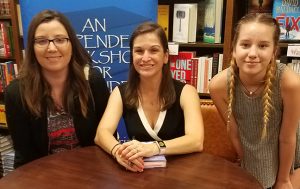 OH MAN. I got to meet Sarah Dessen. I almost cried when she walked out. I blabbered like a total idiot when she signed my book, and I told her that she was the author who inspired me to start writing about 10 years ago, that my daughter was named after a character in her book, and that I recently signed my first big book deal. I told her I wanted to thank her, and she said, “I appreciate it so much, but remember that YOU are the one who wrote the book that got a deal. You deserve to the credit, not me.” ISN’T SHE AMAZING? Check out this shot of me being a total fangirl, and my daughter, whose sarcasm inspired my new book.
OH MAN. I got to meet Sarah Dessen. I almost cried when she walked out. I blabbered like a total idiot when she signed my book, and I told her that she was the author who inspired me to start writing about 10 years ago, that my daughter was named after a character in her book, and that I recently signed my first big book deal. I told her I wanted to thank her, and she said, “I appreciate it so much, but remember that YOU are the one who wrote the book that got a deal. You deserve to the credit, not me.” ISN’T SHE AMAZING? Check out this shot of me being a total fangirl, and my daughter, whose sarcasm inspired my new book.